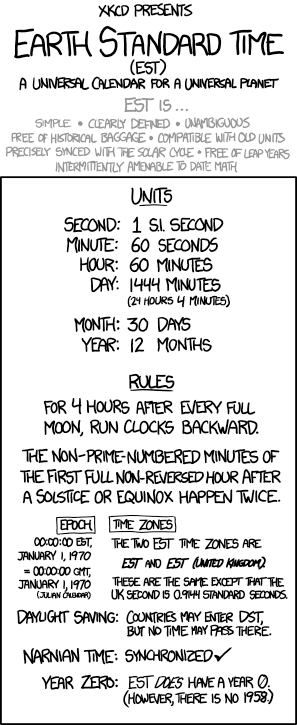May 28, 2012
#1061: EST explain

[Caption above the frame:]
xkcd presents
[In large letters:] Earth Standard Time
[In regular text:] (EST)
A universal calendar for a universal planet
[In small, grey letters:] EST is…
Simple • Clearly defined • Unambiguous
Free of historical baggage • Compatible with old units
Precisely synced with the solar cycle • Free of leap years
Intermittently amenable to date math
[Inside the frame a list of the details concerning EST is shown:]
Units
Second: 1 S.I. second
Minute: 60 seconds
Hour: 60 minutes
Day: 1444 minutes (24 hours 4 minutes)
Month: 30 days
Year: 12 months
Rules
For 4 hours after every full moon, run clocks backward.
The non-prime-numbered minutes of the first full non-reversed hour after a solstice or equinox happen twice.
[In two columns the “Epoch” is put into a contrasting juxtaposition to “Time Zones”, and the text is smaller:]
Epoch
00:00:00 EST, January 1st, 1970 = 00:00:00 GMT, January 1st, 1970 (Julian Calendar)
Time Zones
The two EST time zones are EST and EST (United Kingdom). These are the same except that the UK second is 0.9144 standard seconds.
[The text returns to regular size except when trying to fit text into a space:]
Daylight saving: Countries may enter DST, but no time may pass there.
Narnian Time: Synchronized✔
Year Zero: EST does have a year 0. (However, there is no 1958.)